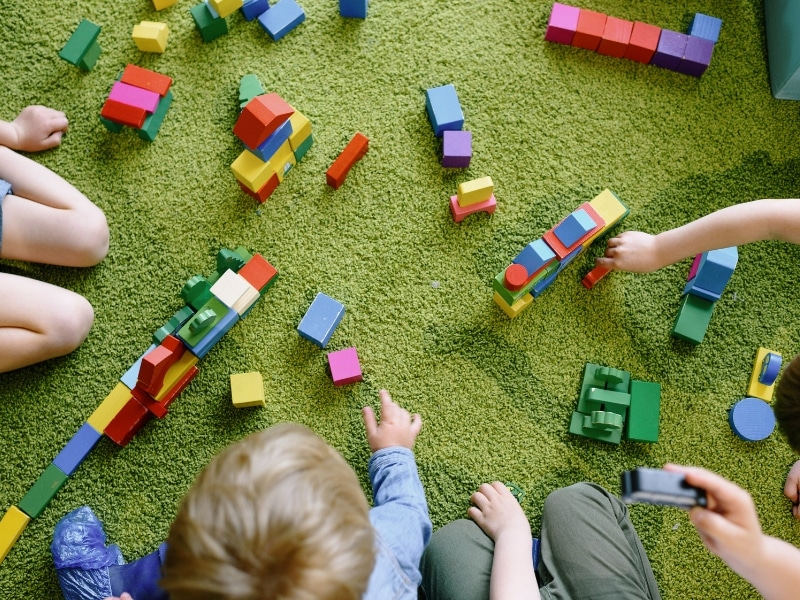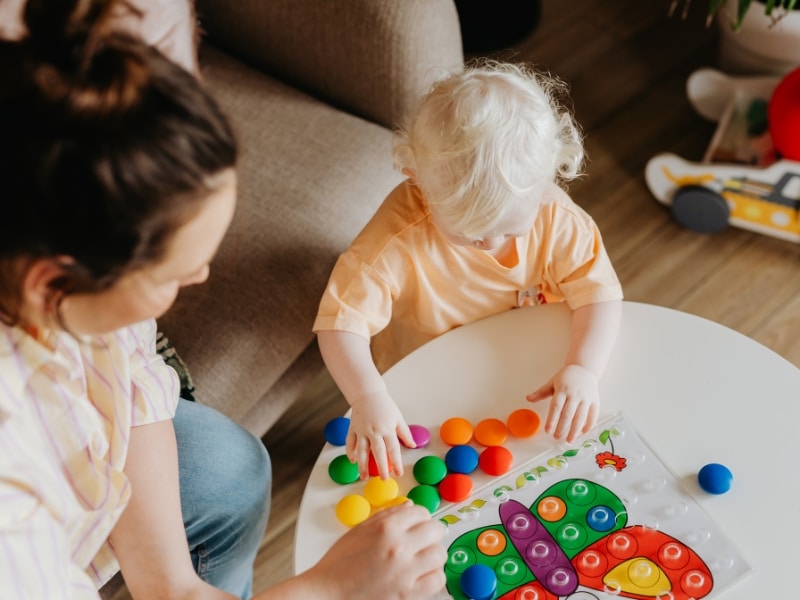What Is The Importance Of Play-Based Learning For Toddlers?

Play-based learning is vital to early childhood education, especially for toddlers. It supports their cognitive, physical, emotional, and social development in a way that traditional learning methods often cannot. As toddlers still discover the world around them, play allows them to experiment, explore, and express themselves naturally. This article explores the importance of play-based learning for toddlers and how it lays the foundation for lifelong learning and development.
Why Is Play-Based Learning Important for Toddlers?
Play-based learning is an educational approach that uses play as the primary tool for learning. The importance of play-based learning for toddlers goes beyond just having fun; it helps them develop a wide range of skills that will benefit them throughout their lives. When toddlers engage in play, they learn in a natural, stress-free environment that encourages creativity, problem-solving, and social interaction.
- Encourages creativity and imagination
- It helps build problem-solving skills
- Supports social and emotional development
- Promotes motor skills and physical development
Play allows children to explore their world, make decisions, and experiment with new concepts. By incorporating play-based learning into their daily routines, toddlers gain critical skills to set a foundation for future learning and success.
How Does Play-Based Learning Support Toddler Development?
Play-based learning goes beyond just having fun; it plays a crucial role in developing toddlers. This type of learning supports various aspects of development, including cognitive, language, physical, and social-emotional growth. Toddlers learn best when interacting with their environment, other children, and caregivers, allowing them to build skills hands-on and engagingly.
- Cognitive Development: Toddlers develop problem-solving skills and learn to think critically.
- Language Skills: Children are exposed to new vocabulary through play, boosting their communication abilities.
- Physical Skills: Active play helps develop fine and gross motor skills, such as hand-eye coordination.
- Social Skills: Interaction with peers during play encourages sharing, empathy, and teamwork.
Each developmental area is interlinked and supported by play, making it an essential part of early childhood education.
What Skills Can Toddlers Gain From Play-Based Learning?
Play-based learning offers toddlers a fun and effective way to develop crucial skills for their growth. These skills will support their future academic, social, and emotional development.
| Skill | Description |
| Problem-solving & Critical Thinking | Toddlers practice figuring out solutions to challenges. |
| Language & Communication Skills | They develop vocabulary and improve their ability to express themselves. |
| Social Skills | Teaches sharing, taking turns, and interacting with others. |
| Emotional Regulation & Self-awareness | It helps toddlers manage emotions and understand themselves. |
| Motor Skills | Improves hand-eye coordination, balance, and physical movement. |
Play-based learning is a powerful way for toddlers to build foundational skills to help them throughout their lives. By engaging in various activities, they grow in confidence and competence.
How Does Play Encourage Social Skills in Young Children?
Social skills are essential for toddlers as they interact with others outside their family. Play-based learning provides opportunities for children to practice these skills in a natural setting. During play, toddlers learn to negotiate, share, take turns, and healthily express their emotions.
- Building friendships: Play allows toddlers to engage with their peers, forming bonds and friendships.
- Communication skills: Through play, toddlers learn to listen, follow instructions, and express themselves effectively.
- Conflict resolution: By interacting with others, toddlers develop the ability to solve problems and manage disagreements.
- Empathy: Engaging in cooperative play helps toddlers understand the feelings of others, fostering empathy.
Play is a social experience that helps toddlers build the skills to interact with their peers and develop meaningful relationships.
Why Is Play-Based Learning Better Than Traditional Learning Methods?
Traditional learning focuses on rote memorisation, whereas play-based learning encourages exploration and hands-on experiences.
Key Differences Between Play-Based and Traditional Learning:
| Feature | Play-Based Learning | Traditional Learning |
| Learning Approach | Hands-on, interactive | Lecture-style, structured |
| Focus | Creativity and problem-solving | Memorisation and repetition |
| Student Engagement | High, active participation | Passive learning |
| Social Skills Development | Strong peer interactions | Limited peer engagement |
| Motivation | Driven by fun and curiosity (intrinsic motivation) | Often relies on external rewards. |
Play-based learning provides a well-rounded educational experience that fosters a love for learning while supporting multiple aspects of development.
What Are the Key Benefits of Play-Based Learning for Toddlers?
The benefits of play-based learning for toddlers are vast and varied. This method highlights the importance of play-based learning in helping children develop various skills. Still, it also has long-term positive effects on their emotional well-being, academic performance, and ability to navigate the world around them.
- Fosters a love of learning: When toddlers enjoy learning, they are likelier to continue exploring new concepts.
- Supports healthy brain development: Active play stimulates brain activity, enhancing cognitive growth.
- Improves focus and attention: Play allows toddlers to concentrate on tasks, enhancing their ability to focus in other settings.
- Promotes independence and confidence: Toddlers gain a sense of accomplishment as they learn new skills and master challenges.
Incorporating play into a toddler’s daily routine helps create a balanced approach to learning that encourages growth in all areas of development.
Why Should Toddlers Engage in Hands-On Learning Activities?
Hands-on learning activities are a fundamental aspect of play-based learning. By engaging in activities involving their senses, toddlers can connect their knowledge to the world around them. Hands-on activities, such as playing with clay, exploring nature, or building with blocks, allow toddlers to experience learning tangibly.
- Encourages active participation: Toddlers are more engaged when physically interacting with materials.
- Promotes sensory exploration: Activities like touch, sight, and hearing help toddlers develop their sensory processing skills.
- Boosts problem-solving abilities: Hands-on activities require children to think critically and make decisions based on observations.

- Enhances creativity: Manipulating materials and exploring different textures encourages imaginative thinking.
Hands-on learning activities are integral to fostering curiosity and encouraging exploration in toddlers, setting them up for success in future learning environments.
How Does Play-Based Learning Help Toddlers’ Emotional Development?
Emotional development is as important as physical and cognitive growth for toddlers. Play-based learning is important because it helps them explore their emotions, understand their feelings, and learn coping strategies.
- Emotional regulation: Through play, toddlers learn to manage their emotions, such as frustration, excitement, and disappointment.
- Self-awareness: Play helps toddlers understand their feelings and recognise them in others.
- Confidence-building: When toddlers succeed in play, they develop a sense of accomplishment, building self-esteem.
- Empathy: Play with others fosters the ability to understand and respond to peers’ emotions.
By engaging in play-based learning, toddlers build emotional intelligence to serve them throughout their lives.
Conclusion
In conclusion, the importance of play-based learning cannot be overstated. This approach supports toddlers’ cognitive and physical growth in emotional and social skills. As a parent or guardian, choosing a daycare or early childhood education program for toddlers that focuses on play-based learning ensures your child receives the best foundation for future learning and success.
Why Play-Based Learning Is Essential for Toddlers
If you’re looking for a daycare that prioritises your child’s development through play-based learning, Innocent Minds in Punchbowl and Yagoona is here to help. Our toddler programs, kindergarten curriculum, and outdoor play activities are designed to foster a love for learning and support your child’s growth in all areas. Contact Innocent Minds today to learn more about how we can help your little one thrive!
